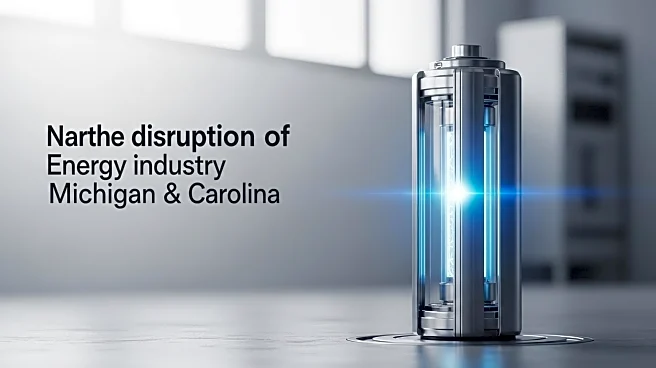What is the story about?
What's Happening?
Natron Energy, a company focused on developing sodium-ion batteries, has announced its closure, ceasing operations in Michigan and North Carolina. Founded in 2012, Natron aimed to provide a sustainable alternative to lithium-ion batteries. The company had planned a $1.4 billion gigafactory in Edgecombe County, North Carolina, expected to create 1,000 jobs and produce 24 gigawatt-hours of sodium-ion batteries annually by 2028. This project was supported by federal incentives from the Inflation Reduction Act of 2022. However, due to financing challenges, Natron will discontinue operations on September 3, 2025. The closure affects the commercial team, and the company will not fulfill any current or future orders.
Why It's Important?
The closure of Natron Energy highlights the challenges faced by companies attempting to scale innovative technologies. The sodium-ion battery technology was seen as a promising alternative to lithium-ion batteries, offering advantages such as abundant raw materials and safer performance. The shutdown impacts the clean energy sector, particularly in North Carolina, where the gigafactory was expected to boost the local economy significantly. The decision underscores the need for robust financial backing and strategic planning in the energy storage industry, as well as the influence of political decisions on clean energy initiatives.
What's Next?
The closure of Natron Energy may lead to increased scrutiny of financial and strategic planning in the energy storage industry. Policymakers and industry leaders might need to coordinate efforts to ensure the competitiveness of alternative battery technologies like sodium-ion batteries. The impact on local economies in Michigan and North Carolina could prompt discussions on how to support clean energy projects and attract investments despite political challenges.
Beyond the Headlines
The shutdown of Natron Energy raises questions about the future of sodium-ion battery technology in the U.S. Despite its advantages, the technology faces supply chain vulnerabilities and market pressures. The closure serves as a reminder of the complexities involved in scaling up innovative technologies and the need for coordinated efforts to overcome these challenges.

















